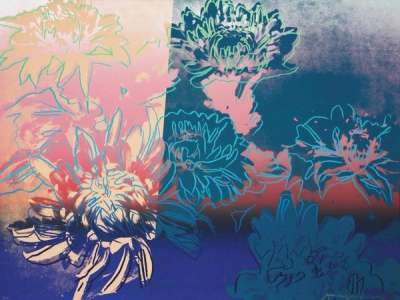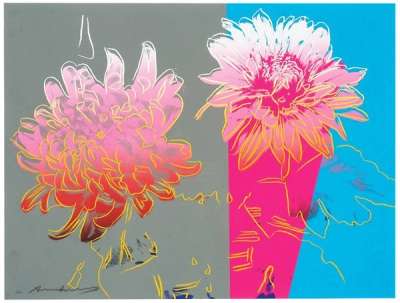
Kiku (F. & S. II.307)

Kiku (F. & S. II.307)
Signed Print
Andy Warhol
£15,000-£23,000Value Indicator
$30,000-$50,000 Value Indicator
$27,000-$40,000 Value Indicator
¥140,000-¥220,000 Value Indicator
€17,000-€26,000 Value Indicator
$150,000-$230,000 Value Indicator
¥2,810,000-¥4,310,000 Value Indicator
$20,000-$30,000 Value Indicator
AAGR (5 years) This estimate blends recent public auction records with our own private sale data and network demand.
There aren't enough data points on this work for a comprehensive result. Please speak to a specialist by making an enquiry.
Medium: Screenprint
Edition size: 300
Year: 1983
Size: H 50cm x W 65cm
Signed: Yes
Format: Signed Print
TradingFloor
Track this artwork in realtime
Watch artwork, manage valuations, track your portfolio and return against your collection
Track auction value trend
Auction Results
| Auction Date | Auction House | Location | Hammer Price | Return to Seller | Buyer Paid |
|---|---|---|---|---|---|
| May 2024 | SBI Art Auction | Japan | |||
| August 2023 | Sotheby's London | United Kingdom | |||
| September 2021 | Bonhams Los Angeles | United States | |||
| September 2016 | Sotheby's Online | United Kingdom | |||
| October 2012 | Christie's New York | United States | |||
| April 2009 | Christie's New York | United States | |||
| October 2008 | Christie's New York | United States |
Meaning & Analysis
Kiku (F. & S. II.307) is a screen print from Andy Warhol’s Kiku series (1983). Warhol’s career-long fascination with flowers prompted Fujio Watanuki, the founder of the Gendai Hanga Centre in Tokyo, to commission the series based on the motif of the Japanese flower,chrysanthemum (‘kiku’ in Japanese). This print shows a delicate display of two overlapping chrysanthemums, one as a red outline and one rendered in bright blue, as symbols for Japanese imperial power, rendered in his classic aesthetic of colour-field patterning and precious multi-coloured silhouettes.
Kiku (F. & S. II.307) contrasts with Warhol’s earlier iterations of flower subjects as it exhibits a peaceful, elegant atmosphere and is created on a much smaller scale so as to adhere to conventional Japanese living spaces. As well as symbolising the Japanese Emperor, the chrysanthemum is representative of longevity, rejuvenation and the autumn season. This is reflected in Warhol’s harmonising colour choice of blue, yellow, orange and red and emphasis on hand drawn lines that overpower the photographic element of this piece.
First visiting Japan in 1956 whilst travelling around the world, Warhol returned for a second time in 1974 for a solo exhibition at the Daimaru Department Store. This series is indicative of Warhol’s global influence and that he was much admired by Japanese collectors and gallerists.


